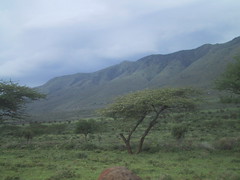 Image by Mpigapicha via FlickrFirst I must say that this book is not for modern entertainment. It was a book Blixen wrote for herself. Only those who are interested in her "personally", or her unusual life experience, can be patient enough to finish the book.
Image by Mpigapicha via FlickrFirst I must say that this book is not for modern entertainment. It was a book Blixen wrote for herself. Only those who are interested in her "personally", or her unusual life experience, can be patient enough to finish the book. Inside this book, Blixen recalled her life in Africa, when she had a farm at foot of Ngong Hills, Kenya. Very differently from the movie, she didn't mention any of her private life. She only had one sentence for her husband, and about Denys Finch Hatton, who was so important in the movie, Blixen only contributed about 40 pages (among whole 370 pages), in which we found no explicit description about they "love affair".
The opening pages about Africa highlands and Ngong Hills are simply brilliant. It's the best part of the book which I could read again and again (it reminds me the opening chapter of "Rebecca"). Soon after finishing "painting" this scenery, Blixen spent majority part of book to write about some native characters, such as her servants,cooks, etc. She also mentioned her white friends, who came to visit her and entertained her lonely time. Among these "entertainment" Denys Finch Hatton was the most important one.
Within about 40 pages, Blixen wrote about her "friendship" with Denys: their amazing Safaris, and their once almost daily amazing activity - flying over Africa Highlands. Even though she did not directly describe the true nature of their relationship, it is not hard for readers to see their intimacy. The death of Denys was plainly described, which shows me how tough Blixen was. She also wrote quite much details about choosing burying place for Denys, at the top of Ngong Hills, as Denys wished. The narration in the end of movie was exactly the same from the book, except the last sentence.
Denys Finch Hatton seemed to be an extraordinary figure. Among all his alleged "fine" qualities I admire his free and adventurous spirit the most. So I feel very happy for him that he was buried in a place that fits his will. He deserved this glorious land.
White people are not the main theme of this book. This book is all about native people. Native Africans seemed to be very fascinating to Blixen. They were so different from Europeans, but Blixen did not judge the differences by European stands (not even polygamy). Not only she respected their customs, but also their intelligence. In the movie, this view towards native was transmitted by Denys, but in book, this is Blixen's own philosophy - she admired native culture, found they had more advantages than Europeans in dealing with nature and life. They are many moving details about her relationship with native people, especially during her "hard time" - when she faced 'bankruptcy" and had to live the place she loved so dearly.
 Image via Wikipedia
Image via WikipediaBeside the natives, Blixen's true heroine of this book is African nature. Having been fancying Africa myself for long time, I found the best part of the book are those rich colored delineations of nature: lands, mountains, trees, clouds, sky, animals, and the best of all, the "air". Under her eyes, Africa was impersonated, and interacted with her mind like her confidant (even when she described her relationship with Denys, she used the nature as a metaphor). The book both starts and ends by Ngong Hills, a glorious "noble" mountain which can be seen from Blixen's house. Even though the whole book is not fictional, not chronological, but the real "protagonist"- Africa landscape puts all details together.
Yes, this book was written for Blixen herself, but it was also written for Africa, and for thsoe whoever love Africa and the Nature.

A wonderful book, and a wonderful writer. I also have that deep feeling for nature and that way of being so removed from the confusions and complexities of so-called "civilized" life.
ReplyDeleteThanks NP. I am glad I read the book. I think her poetic depiction of Africa is unequalled.
ReplyDelete